8B下教案
牛津译林版八年级英语下册8BUnit7单词教学案

8(下)Unit 7单词教学案Comic strip& Welcome to the unit1.especially (adv.)特别,尤其It helps build a better world for everyone, especially children all over the world.它帮助为每个人,尤其是全世界的儿童建立一个更美好的世界。
●表示陈述某一事实之后,列举一个具有代表性的例子,作进一步强调,其后可接名词、介词短语、从句等。
如:This street is very busy, especially on Sundays. 这条街很拥挤,尤其是星期天。
We want to invite some friends, ____________________.我们想邀请几个朋友,尤其是吉姆和约翰。
●表示“特别地”,用于修饰形容词或副词,强调程度。
如:It is especially cold today. 今天特别冷。
We need to be _________________. 我们需要特别小心。
I’m feeling especially tired this evening.今天晚上我特别累。
有时也修饰动词。
如:I especially want to see that film. 我特别想看那部电影。
----Do you like sweet things? 你喜欢甜食吗?----Not especially. 不特别喜欢。
2.basic (adj.)基础的,基本的基础教育_______________________ 基本颜色_____________________Children get a better education today than at any time in the past.现今孩子们受的教育比过去任何时候都好4.equal (adj.) 平等的equal pay for equal work 同工同酬They are equal in ability. 他们能力相同。
8B Unit2 Travelling Reading 教案
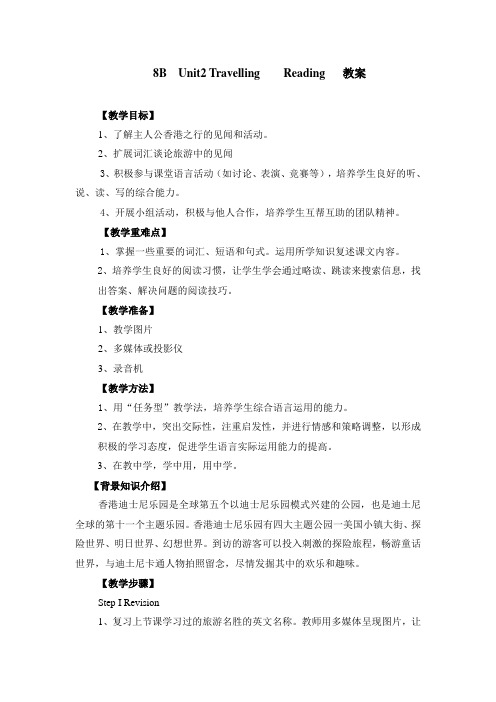
8B Unit2 Travelling Reading 教案【教学目标】1、了解主人公香港之行的见闻和活动。
2、扩展词汇谈论旅游中的见闻3、积极参与课堂语言活动(如讨论、表演、竞赛等),培养学生良好的听、说、读、写的综合能力。
4、开展小组活动,积极与他人合作,培养学生互帮互助的团队精神。
【教学重难点】1、掌握一些重要的词汇、短语和句式。
运用所学知识复述课文内容。
2、培养学生良好的阅读习惯,让学生学会通过略读、跳读来搜索信息,找出答案、解决问题的阅读技巧。
【教学准备】1、教学图片2、多媒体或投影仪3、录音机【教学方法】1、用“任务型”教学法,培养学生综合语言运用的能力。
2、在教学中,突出交际性,注重启发性,并进行情感和策略调整,以形成积极的学习态度,促进学生语言实际运用能力的提高。
3、在教中学,学中用,用中学。
【背景知识介绍】香港迪士尼乐园是全球第五个以迪士尼乐园模式兴建的公园,也是迪土尼全球的第十一个主题乐园。
香港迪士尼乐园有四大主题公园一美国小镇大街、探险世界、明日世界、幻想世界。
到访的游客可以投入刺激的探险旅程,畅游童话世界,与迪土尼卡通人物拍照留念,尽情发掘其中的欢乐和趣味。
【教学步骤】Step I Revision1、复习上节课学习过的旅游名胜的英文名称。
教师用多媒体呈现图片,让学生说出其英文名称。
(复习名胜,激发学生学习兴趣。
)2、Free talk:There are many places of interest in China as well as in other parts of the world.Where would you like to go? Have you ever been to Hong Kong?然后组织学生讨论:Do you know any places in Hong Kong? What can we do there?StepⅡ Presentation1、教师用多媒体展示香港迪土尼乐园的图片,呈现生词theme park、whale fountain等。
8B UNIT1 welcome教学案
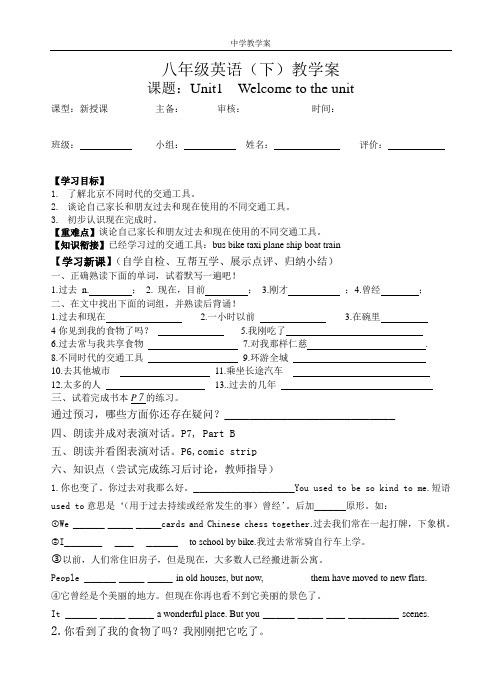
八年级英语(下)教学案课题:Unit1 Welcome to the unit课型:新授课主备:审核:时间:班级:小组:姓名:评价:【学习目标】1.了解北京不同时代的交通工具。
2.谈论自己家长和朋友过去和现在使用的不同交通工具。
3.初步认识现在完成时。
【重难点】谈论自己家长和朋友过去和现在使用的不同交通工具。
【知识衔接】已经学习过的交通工具:bus bike taxi plane ship boat train【学习新课】(自学自检、互帮互学、展示点评、归纳小结)一、正确熟读下面的单词,试着默写一遍吧!1.过去n. ;2. 现在,目前;3.刚才;4.曾经;二、在文中找出下面的词组,并熟读后背诵!1.过去和现在2.一小时以前3.在碗里4你见到我的食物了吗? 5.我刚吃了6.过去常与我共享食物7.对我那样仁慈.8.不同时代的交通工具9.环游全城10.去其他城市11.乘坐长途汽车12.太多的人13..过去的几年三、试着完成书本P 7的练习。
通过预习,哪些方面你还存在疑问?___________________________四、朗读并成对表演对话。
P7, Part B五、朗读并看图表演对话。
P6,comic strip六、知识点(尝试完成练习后讨论,教师指导)1.你也变了。
你过去对我那么好。
________________You used to be so kind to me.短语used to意思是‘(用于过去持续或经常发生的事)曾经’。
后加_____原形。
如:①We _____ ____ ____cards and Chinese chess together.过去我们常在一起打牌,下象棋。
②I______ ___ _____ to school by bike.我过去常常骑自行车上学。
③以前,人们常住旧房子,但是现在,大多数人已经搬进新公寓。
People _____ ____ ____ in old houses, but now,_____ ____ them have moved to new flats.④它曾经是个美丽的地方。
牛津版八年级英语下册教案(表格型)Unit 1 Past and present
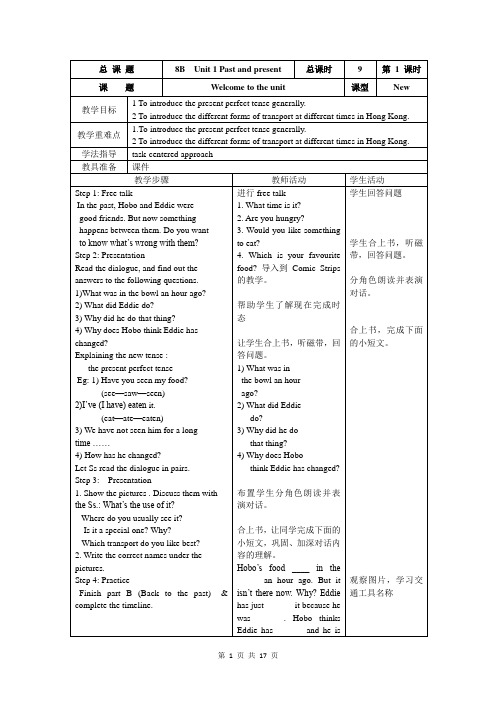
Read the dialogue, and find out the answers to the following questions.
1)What was in the bowl an hour ago?
2) What did Eddie do?
3) Why did he do that thing?
1) What was in
the bowl an hour
ago?
2) What did Eddie
do?
3) Why did he do
that thing?
4) Why does Hobo
think Eddie has changed?
布置学生分角色朗读并表演对话。
合上书,让同学完成下面的小短文,巩固、加深对话内容的理解。
Can you tell us something about the changes to your hometown?
As you know, I am a teacher now. But five years ago, I was a teacher, too. So I have worked here for 3 years. I think our school changed a lot. Do you think so? Everything has changed a lot?
6. What did people say about the shoe factory?
7. Does Mr. Chen think life is better now? Why?
安排学生听录音跟读课文
布置学生完成part B,C,D的练习,并检查答案
初中英语第八册下教案

初中英语第八册下教案单元主题:旅游和旅行教学目标:1. 能够理解和运用本单元的核心词汇和短语,如:旅游、旅行、景点、文化、传统等。
2. 能够理解和运用本单元的主要句型,如:介绍自己的旅游经历、询问他人的旅游计划等。
3. 能够听懂、说出一篇关于旅游和旅行的短文。
教学内容:Lesson 1:介绍自己的旅游经历1. 学习核心词汇和短语:旅游、旅行、景点、文化、传统等。
2. 学习主要句型:介绍自己的旅游经历,如:“我曾经去过...”,“我最喜欢的景点是...”,“我体验了当地的文化和传统...”等。
Lesson 2:询问他人的旅游计划1. 学习核心词汇和短语:计划、目的、方式、时间等。
2. 学习主要句型:询问他人的旅游计划,如:“你计划去哪里旅游?”,“你打算怎样去?”,“你预计什么时候出发?”等。
Lesson 3:介绍一篇关于旅游和旅行的短文1. 学习短文中的核心词汇和短语:旅行、景点、文化、传统等。
2. 学习短文中的主要句型:介绍旅游和旅行的经历,如:“我去过很多地方旅游,我最喜欢的景点是长城”,“我在旅行中体验了当地的文化和传统,非常有趣”等。
教学步骤:Step 1:引入主题1. 向学生提问:“你们喜欢旅游吗?”,引导学生谈论自己的旅游经历。
2. 展示一些旅游图片,让学生猜测这些图片中的景点是哪里。
Step 2:学习核心词汇和短语1. 教授本单元的核心词汇和短语,如:旅游、旅行、景点、文化、传统等。
2. 通过例句和练习,让学生理解和运用这些词汇和短语。
Step 3:学习主要句型1. 教授本单元的主要句型,如:介绍自己的旅游经历,询问他人的旅游计划等。
2. 通过角色扮演和小组活动,让学生听懂和说出一篇关于旅游和旅行的短文。
Step 4:巩固和拓展1. 让学生完成一篇关于旅游和旅行的短文,巩固所学内容。
2. 引导学生思考旅游的意义和价值,拓展他们的思维。
Step 5:总结和作业1. 对本节课的内容进行总结,强调重点和难点。
人教版八年级下册音乐全册教案

人教版八年级下册音乐全册教案第一单元华夏古韵教学设计阳关三叠教学目标:一、感受、体验古曲《阳关三叠》的风格特点,引发对我国古代音乐及民族传统音乐文化的关注。
二、通过对音乐节奏、旋律的分析,体会歌曲忧伤、惆怅的情绪。
教学重点:一、熟唱歌曲的主题旋律。
二、感受歌曲的背景,理解当时作者的心情。
教学难点:“遄行、遄行”八度的大跳,和附点节奏的准确。
教学准备:多媒体课件。
教学过程:一、导入新课。
1、师:你们有没有想过,如果你和好友分别,你会以什么样的方式寄托你的思念呢?(通信、发邮件、打电话、点歌等。
)2、师:你知道有哪些表达友谊的歌曲呢?(《友谊地久天长》音频)。
二、情感体验。
1、师:你们说得很好。
其实古代也有很多表现友谊的音乐作品。
今天,我们一同来欣赏一首描写友谊的古曲,请你听后思考歌曲表达了什么样的情感?(《阳关三叠》音频)。
2、师:同学们,谁能告诉我歌曲表达了怎样的情感?三、诵读歌词。
1、讲述歌词的来源。
师:这段歌词的前一部分实际上是来自一首唐诗,你们知道这首唐诗是谁的什么作品吗?师:这位同学对学过的知识掌握得很扎实。
这首诗在语文课上学过,是唐代诗人王维的名篇《送元二使安西》。
唐朝时,为诗配乐进行演唱十分盛行,很多古诗都被合乐而唱,《阳关三叠》也是其中之一。
原诗描绘了怎样的情节呢?(《阳关三叠》动画)。
2、讨论“三叠”。
师:我想再问一问同学们,你认为《阳关三叠》名字中的“三叠”是什么意思呢?请大家进行讨论。
(学生讨论,允许各抒己见。
)师:同学们都很有想法。
原曲分成三大段,由于将一个曲调变化叠唱了三遍,故名三叠。
教材中选用的是一部分,也就是其中的一叠。
阳关是一个地名,所以歌曲叫《阳关三叠》,曲中还有一个地名——“渭城”,所以歌曲又叫《渭城曲》《阳关曲》。
3、分析歌词。
师:歌词部分比原诗要长,我们来看后面部分的歌词,“遄”这个字念chuán。
齐读一下。
师:“遄行”是指“一路上你要快快地走,快快地走”,寄托了对友人无限关爱之情。
八年级英语下册 Unit1精品教学案(共10课时) 牛津译林版
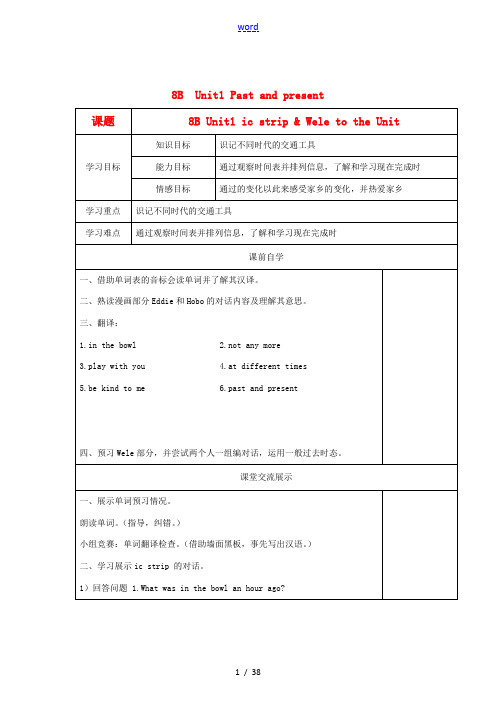
8B Unit1 Past and present8B Units1导学案参考答案Unit1第一课时:一、1.was 2.has eaten 3.to have 4.to play 5.is eating 6.took 7.rode8.will be二、1.would like , grows up 2.walks to school 3.goes to work by bus 4.flies to5.don’t want to any more第二课时:一、1.know about 2.get married 3.move out 4.water pollution 5.in the centreof6.feel lonely7.turn into8.from time to timeed to do 10.in some ways二、well has lived southern got married in the centre of children has changed a lotmarket stallsHas turned into to play cards pleasant shoe factory waste waterfish and plants polluted took action cleaner in some ways open space lonely第三课时:一、1. I don’t want to play with you any more.2.There used to be the home of birds.3.He live in Beijing since he moved here.4.In the past ,many people had no money to go to school.5.Nanjing has changed a lot in the past five years.6.Many friends have moved to other places ,so I feel lonely from time to time.7.I had an interview with my Chinese teacher this morning.8.It has bee more difficult to play chess with my old friends.二、1.Where have they gone ..2.How long has lived3.When was born4.you helping me第四课时:一、1.dishonest 2.unhappy 3.unlucky 4.impolite 5.unkind二、D C C B C A三、1.cheaper 2.healthiest 3.impossible 4.safely 5.well better第五课时:一、1.They haven’t read the book yet.Have they read the book yet? Yes, they have/ No , they haven’t1.How long has Daniel stayed in Shanghai?2. I have known him for ten years.3.Sandy has been in Beijing for half an hour.二、1. Have seen have did see2.lent hasn’t given 3.have been did visit第六课时:一、C C A A D B二、1. He has already finished homework.2.Have you ever been to Beijing?3.I have known Linda for 3years.4. I have just seen Lily.5.We haven’t heard from him for a long time.第七课时:一、1.is 2.do 3.will be 4.shall go 5.taught 6.has taught 7.has gone8.Have seen 9.have learned 10.will arrive二、1.How long have you known him?2.Has Jane finished her homework?3.I haven’t worked in this school for two years.4.Why hasn’t Jim finishedhis homework?5.when did you buy this watch?6.Who is the old man next to Lily?7.Which girl is my sister?8.How far is your home from your school?第八课时:一、1.advantages 2.reduce 3.changed 4.developments 5.service6.interview7.realizes 9.repair二、1.recently 2.unpleasant 3.impolite 4.have done 5.left6.southern7.polluted8.Has arrived arrived9.has eaten 10.have been第九课时:第十课时:一、1.as often as before 2. have an interview with sb ed to do sth 4.so big and modern5.in the north of二、1. was has lived 2.was made 3.Has arrived arrived 4.has eaten5.safely6.has been7.have been三、1.B 2.C 3.B 4.C 5.D 6.A四、1.Have you anything 2.doesn’t provide any longer 3.since ago ed to5.has been to。
牛津英语8BUnit1Pastandpresent单元分析及课时教案
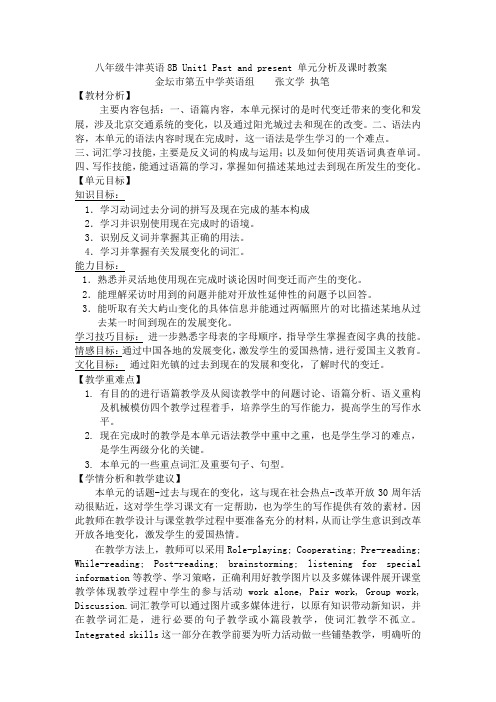
八年级牛津英语8B Unit1 Past and present 单元分析及课时教案金坛市第五中学英语组张文学执笔【教材分析】主要内容包括:一、语篇内容,本单元探讨的是时代变迁带来的变化和发展,涉及北京交通系统的变化,以及通过阳光城过去和现在的改变。
二、语法内容,本单元的语法内容时现在完成时,这一语法是学生学习的一个难点。
三、词汇学习技能,主要是反义词的构成与运用;以及如何使用英语词典查单词。
四、写作技能,能通过语篇的学习,掌握如何描述某地过去到现在所发生的变化。
【单元目标】知识目标:1.学习动词过去分词的拼写及现在完成的基本构成2.学习并识别使用现在完成时的语境。
3.识别反义词并掌握其正确的用法。
4.学习并掌握有关发展变化的词汇。
能力目标:1.熟悉并灵活地使用现在完成时谈论因时间变迁而产生的变化。
2.能理解采访时用到的问题并能对开放性延伸性的问题予以回答。
3.能听取有关大屿山变化的具体信息并能通过两幅照片的对比描述某地从过去某一时间到现在的发展变化。
学习技巧目标:进一步熟悉字母表的字母顺序,指导学生掌握查阅字典的技能。
情感目标:通过中国各地的发展变化,激发学生的爱国热情,进行爱国主义教育。
文化目标:通过阳光镇的过去到现在的发展和变化,了解时代的变迁。
【教学重难点】1.有目的的进行语篇教学及从阅读教学中的问题讨论、语篇分析、语义重构及机械模仿四个教学过程着手,培养学生的写作能力,提高学生的写作水平。
2. 现在完成时的教学是本单元语法教学中重中之重,也是学生学习的难点,是学生两级分化的关键。
3. 本单元的一些重点词汇及重要句子、句型。
【学情分析和教学建议】本单元的话题-过去与现在的变化,这与现在社会热点-改革开放30周年活动很贴近,这对学生学习课文有一定帮助,也为学生的写作提供有效的素材。
因此教师在教学设计与课堂教学过程中要准备充分的材料,从而让学生意识到改革开放各地变化,激发学生的爱国热情。
在教学方法上,教师可以采用Role-playing; Cooperating; Pre-reading; While-reading; Post-reading; brainstorming; listening for special information等教学、学习策略,正确利用好教学图片以及多媒体课件展开课堂教学体现教学过程中学生的参与活动work alone, Pair work, Group work, Discussion.词汇教学可以通过图片或多媒体进行,以原有知识带动新知识,并在教学词汇是,进行必要的句子教学或小篇段教学,使词汇教学不孤立。
- 1、下载文档前请自行甄别文档内容的完整性,平台不提供额外的编辑、内容补充、找答案等附加服务。
- 2、"仅部分预览"的文档,不可在线预览部分如存在完整性等问题,可反馈申请退款(可完整预览的文档不适用该条件!)。
- 3、如文档侵犯您的权益,请联系客服反馈,我们会尽快为您处理(人工客服工作时间:9:00-18:30)。
八年级第二学期下Module2 Mass mediaUnit 5 Magazine artiBlind man and eyes in fire dramaReading章节分析(Reading Analysis)(一)综述Reading部分给我们讲述了一个关于一位盲人和他的狗被困在着火的旅店中,最终获救的故事。
在引导学生对文章进行整体理解的同时,培养学生的安全意识,并了解有关在火灾中的自救方法,还让学生感到人类与动物是朋友。
同时学习一些核心词汇和词组:as soon as, reception, initials, allow, explain, bark, sound like, repeat, interrupt, personally, location, safety first, sensible, blanket, go off, surface, seem like, explainMore practice 部分是要求学生看图后用完整句表达火灾中不同人物的动作。
(二)目标Reading1、知识目标:让学生掌握课文中重点词、词组、句型和语法,了解课文内容。
2、能力目标:让学生学习用正确的时态和方法讲述所发生的事情。
3、情感目标:1)、渗透生命教育,教育学生要有安全意识,学会在发生火灾的情况下自救的方法。
2)、唤起学生对动物的热爱,体会到动物是自然的一部分,树立人与动物和谐相处的意识,人类与动物是好朋友。
More practice:看图后,运用在本课Reading 中学过的词语,以完整的句子来表达人物的行为。
(三)教学方法采用任务型教学法组织教学,通过听说,讨论等具体活动,达到教学效果。
(四)重点和难点1、词汇学习1) 核心词汇drama一系列的事 location位置reception服务台 sensible明智的initials首字母 describe描写exclaim大叫 blanket毯子bark吠 towel毛巾interrupt打断 explain解释personally亲自地2) 拓展词汇dramatic戏剧性的 personal个人的 locate位于sense感官 description描写 explanation解释2、词组as soon as一…就… go to the reception desk去服务台book a room预定一个房间 be welcome to do欢迎做某事allow sb to do允许某人做某事 sound like听起来象at once马上,立刻lead sb personally to sp 亲自带某人去某地the location of the fire exit安全出口的位置 safety first安全第一go off突然爆发响声 the bottom of…底部lie on the floor躺在地板上music to my ears对我的耳朵来说是音乐be against the rules违反规定 save one’s life拯救某人的命1period 1教学设计(Teaching Designs)Procedure:1、Show students the picture on page 40 in the book.2、Ask two questions。
1).What was happening in the picture?2).If the fire happened to you, what should you do?3、Let students discuss the questions in groups4、Give a summary1).Feel the door of your room if it isn’t hot, you can run through the fire exit of your building to the safe place. If it is hot, don’t open it. Put wet towel or blankets along the bottom of the door.2).Dial 110 and give the address of your room.3).Lie on the floor where the air is fresher and wait.4).When you hear the fire engine outside, open your window, wave and shout.5).Do what the fireman tells you. Do not argue.1.Who is John F Dancer’s friend?2.Has John booked a room in the hotel before?3.What was the first trouble John met that day?4.Why didn’t the clerk left Charlie into the hotel?5.Charlie was allowed to stay at the hotel, wasn’t he?6.Which place did John want to know before entering the room?7.What happened to John?8.What was John doing when the hotel was on fire?9.Who woke John?10.Were they saved at last?Homework: Copy the new words, read the textSelf-reflectionReading部分给我们讲述了一个关于一位盲人和他的狗被困在着火的旅店中,最终获救的故事。
在引导学生对文章进行整体理解的同时,培养学生的安全意识,并了解有关在火灾中的自救方法,还让学生感到人类与动物是朋友。
课文学习的前期准备,学生还是比较感兴趣的。
2Period 2教学重点:进一步阅读,理解课文语言知识点讲解Dragon’s Head HotelFire rules1.Make sure you know the (1) on the fire (2) nearest yourroom.2.If there is a fire outside your room:2.1 (3) the door of your room. If it is (4) , do not open it. Put _ (5) (6) along the (7) of the door to keep the smoke out.2.2 (8) the reception desk and give your room number.2.3 (9) on the floor where the air is freshest and (10) .2.4 When you (11) the fire engine outside, (12) your window, (13) and (14) .2.5 Do exactly what the (15) tells you. Do not argue.Key:(1) location (2). exit (3). Feel (4). hot (5). wet (6). towels (7). bottom(8). Phone (9). Lie (10). wait (11). hear (12). open (13). wave (14). shout(15). firemanE2 Write the number of the rules that John could not obey.[语言知识]1.book (v.) 预定eg: I have booked a room for you.booking (n.) 预定eg: booking office 销售处2.drama 戏剧、戏剧性的事件eg: It’s a real drama to see you argue with your classmates. dramatic(a.) 戏剧性的eg: It’s a dramatic ending to all of us.3.initial(a.) 最初的、词首的eg: Her initial stage of being a doctor was in the USA.initial (n.) 姓名起首的大写字母eg: J F D are my initials.Initially (ad.) 最初的eg: He initially went to Britain for further study.4.location (n.) 地点、位置eg: Xujia Hui is a wonderful location. Many people would like to live there.Locate (v.) 找到…的位置eg: I can’t locate the shop.be located in 位于eg: Jinmao Building is located in Pudong New area.5.personally (ad.) 亲自地eg: The inn keeper usually served the customers personally.personal (a.) 私人的、个人的eg: I’d rather pay a personal visit to you this time.6.reception (n.) 接待、接待处eg: Usually in the front area of the hotel, there is a reception. receptionist (n.) 接待员eg: My initial job was working as a receptionist.reception desk 接待处 reception room 会客室Homework: copy the new phrases, recite the text.Self-reflection分析课文中的知识点,是课文学习的重点和要点,很多考试的内容都在这里,所以一定要认真仔细,还要拓展,我想英语的拓展就在这里是最多的了。
